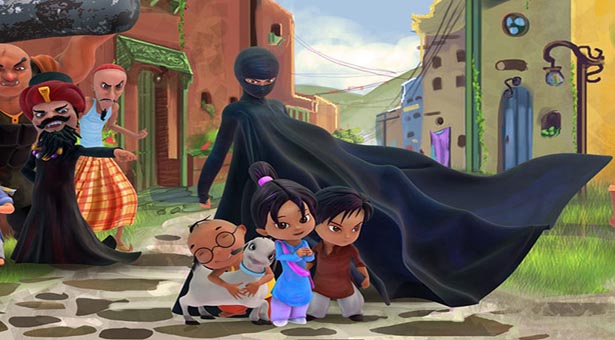By Nighat Dad
Burka Avenger is an action-comedy cartoon series for children featuring Pakistan’s first ever female super-hero. Released in August 2013 on Geo TV in Pakistan, it was met with phenomenal success − and criticism. The teacher-by-day, masked-vigilante-by-night super-hero squarely takes on Taliban-like figures, but also the more contentious issue of women’s choices: should (can?) a super-hero be wearing a burka?
Have a look at the first episode of the Burka Avenger below
Burka Avenger is set in an imaginary village called Halwapur and its protagonist Jiya is, by day, a good-natured school teacher with a strong sense of responsibility towards her community. Her character is portrayed as a self-assured and independent woman. She assumes the alter ego of a masked vigilante when she battles local miscreants. The name Burka Avenger comes from the all-encompassing burka that Jiya as a nighttime super-hero wears; interestingly, the modest school teacher does not wear a burka to work.
The animation is set against the backdrop of an aggressive militant campaign operating in Northwest Pakistan where the Taliban have uprooted hundreds of schools. As a consequence, tens of thousands of girls have been denied their fundamental right to education. The release of Burka Avenger less than a year after the shooting of teenage girls’ rights campaigner MalalaYusufzai makes the drawing of parallels inevitable.
Despite assuming the role of a fighter, Burka Avenger does not use guns or explosive weapons. She does not maim or kill her enemies. She does even punch or kick her opponents. She hurls books and pens at the thugs, a literal take on the comparison between the pen and the sword. Burka Avenger derives her super-human powers from Takht Kabaddi which is shown as an ancient martial arts discipline. Her fighting style follows the moral code of self-control and inner peace. Her villains include Baba Bandooq, an evil magician who thinks girls shouldn’t be educated and Vadero Pajero, a corrupt, feudal politician who conspires with Baba Bandooq in his evil plans.
Burka Avenger has generated strongly polarised opinions among both conservatives and liberals in Pakistani social media. Conservatives charge that the cartoon series ridicules the burka and the beard, symbolic of organised Islam. On the other side, some feminist opinion-makers have expressed their concerns regarding the use of burka, a religious symbol, in a children’s program. They contend that the use of an oppressive religious clothing even for some special purpose is not justifiable. Feminists are apprehensive that over time, given the popular appeal of Burka Avenger, it might develop into a Pakistani cultural icon. In that case, young girls may look up to Burka Avenger as a role model. That may, in turn, contribute to the promotion of ‘burka culture’ in Pakistani society.
It is important to note here that the burka has not been glorified anywhere in the program. The tight ninja-like costume depicted in this cartoon series is very different from the traditional burka worn by women in some sections of Pakistani society. The burka allows Jiya to maintain her secret identity; she effectively uses it to her own advantage in her fight against the forces of evil, a lot like a mask or invisibility cloak does for any other super-hero. In this series the burka does not represent modesty, rather, the show represents it as a powerful aid as some other Pakistani commentators have said. The original concept of the burka has actually been subverted in this show; where ordinarily the burka may be considered a limit on a woman’s mobility, here the character is in control of it. The burka grants her greater freedom of action to accomplish her missions. To that extent, the burka is a source of strength for Jiya which does not block her self-identity.
Burka Avenger’s appeal lies in its local flavour. It presents an image markedly different from typical hyper-sexualised female super-hero depictions in other games and animated series. With its spectacular imagery, effects, eccentric characters and a range of social issues, this TV series has the potential for nudging deeper shifts in social behaviour over time. What must not be forgotten about this groundbreaking project is that it lends voice to thousands of female students in Pakistan whose schools have been forcibly shut down by the Taliban.
Nighat is a lawyer, international development consultant, researcher and the director of the Digital Rights Foundation in Lahore, Pakistan. Digital Rights Foundation is a research based advocacy organization focusing on ICTs to support human rights, democratic processes and digital governance. Nighat’s work addresses cyberlaws, internet governance issues as well as civil society’s concerns over restrictions on freedom of expression and ICT use. She tweets as @nighatdad

